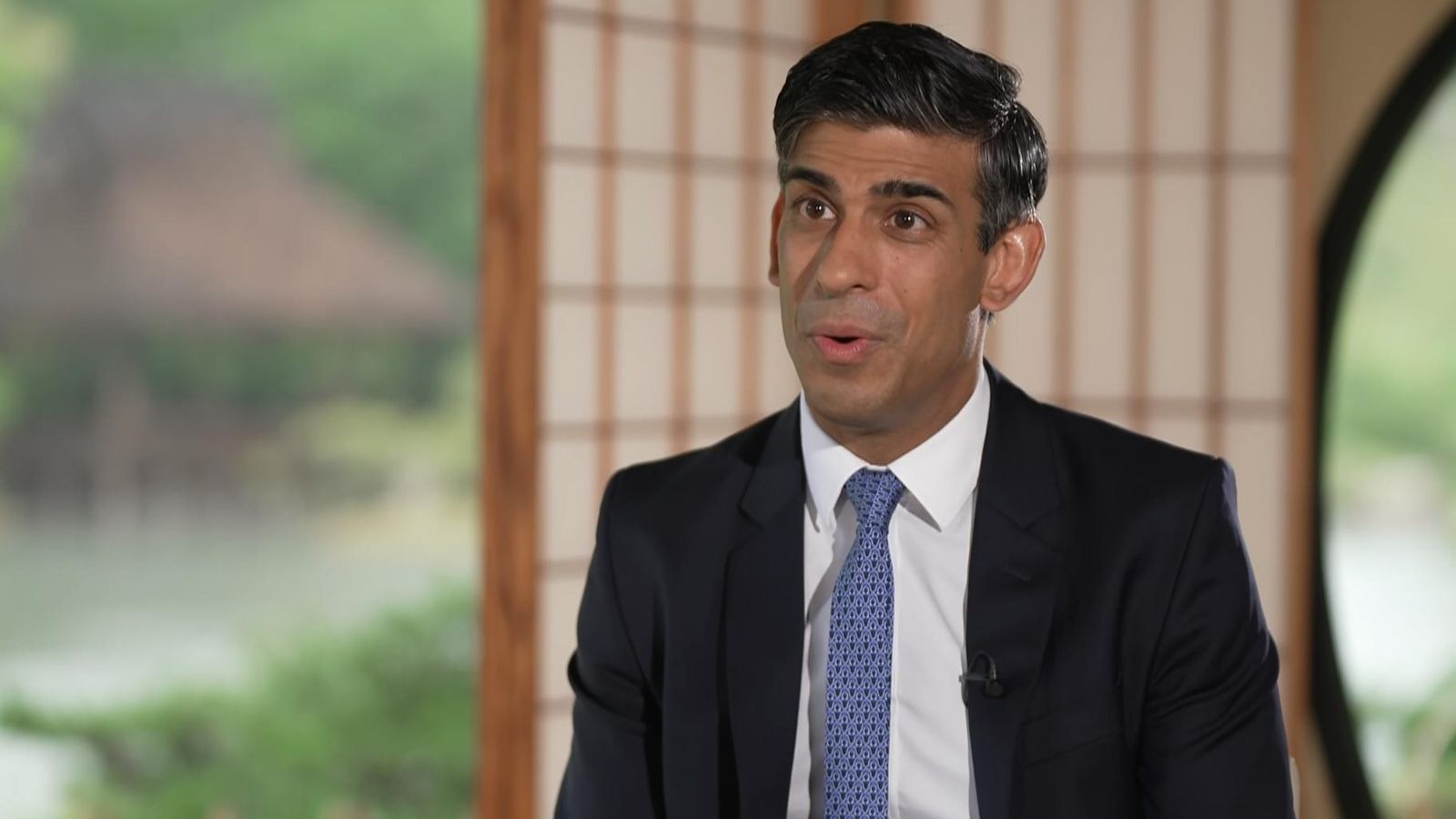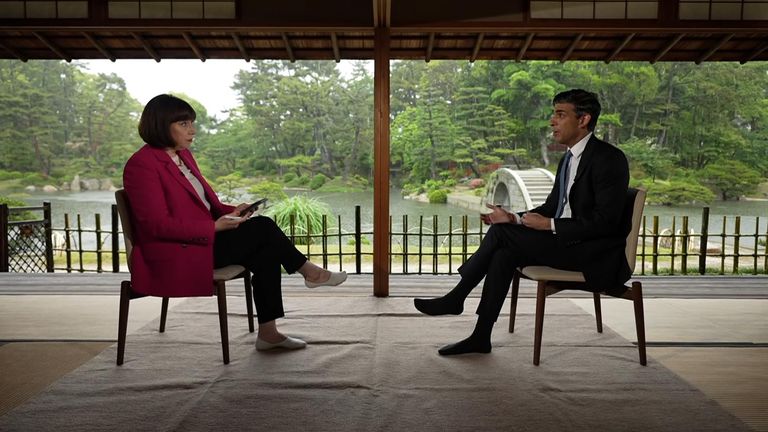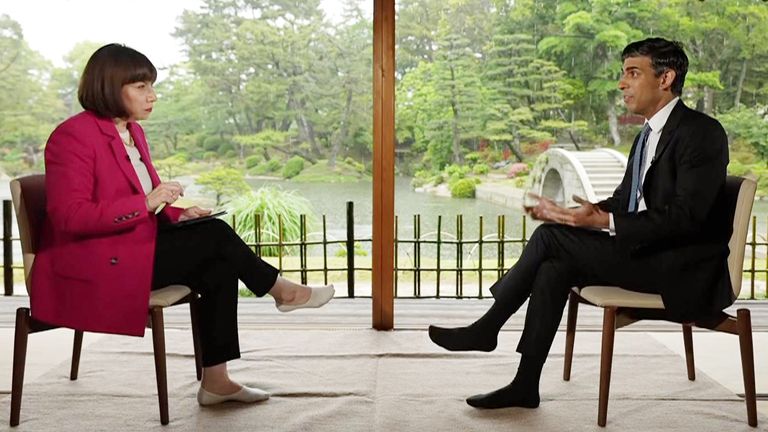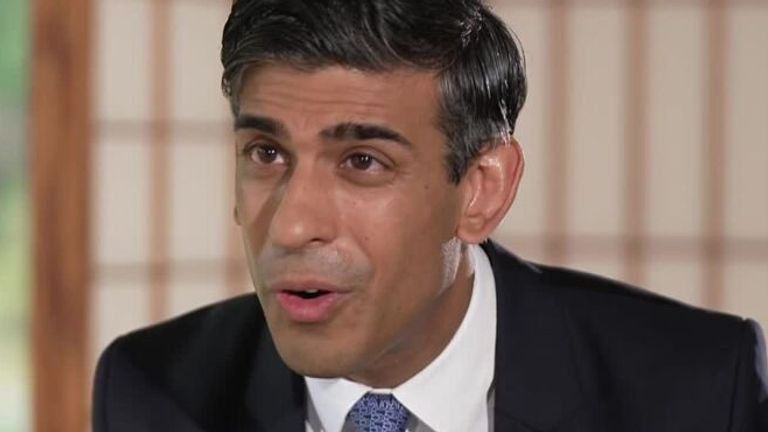Rishi Sunak has vowed to bring the level of net migration down to below the 500,000 figure he “inherited” as prime minister.
Mr Sunak said he was “focused” on cutting the level of net migration, which stood at 504,000 for the year to June 2022. He became prime minister in October of that year.
He is coming under increasing pressure over the issue of migration after he appeared to back away from a commitment made under his predecessor, Boris Johnson, that net migration would fall below 250,000.
Net migration is the annual number of people arriving in the UK when both immigration and emigration are taken into account.
There have been some forecasts suggesting that net migration will continue to climb to as high as a million people – despite the 2019 Conservative manifesto committing to making sure “overall numbers come down”.
At the time, net migration stood at 226,000.
In an interview with Sky News political editor Beth Rigby from the G7 summit in Japan, Mr Sunak was asked whether net migration numbers were going up or down.
Mr Sunak refused to “pre-empt” future numbers, but he said there were a “set of factors” which led to the current figure, including the UK taking in Ukrainian refugees.
Question stumps Sunak in Sky News interview – politics latest
He declined to commit to reducing overall net migration to a specific level multiple times in the interview, but after repeated probing committed to bringing numbers below those when he took office.
“I’m committed to bringing down the levels of net migration that I’ve inherited,” he said.
He added: “I’m focused on bringing down the levels of legal migration, but I am also completely focused as one of my five priorities on stopping the boats and I think that is the country’s priority when it comes to migration.”
Figures from the Office for National Statistics (ONS) published last November showed that an estimated 504,000 more people came to the UK than left last year – a figure greater than the population of Liverpool.
The figure smashed the previous post-war net migration high of 329,000, set in 2015.
There have been jitters in the Conservative party over forecasts from the Centre for Policy Studies (CPS) that net migration could rise to between 700,000 and 997,000 for the year to December.
The ONS is expected to give its official update next week.
Speaking to Sky News on Thursday, former Tory leader Sir Iain Duncan Smith said he believed “we’ll see some very startling figures, but we have to bear down on that”.
Sir Iain said the issue of high numbers wasn’t just because of small boats in the Channel – which the prime minister has vowed to tackle as one of his five key pledges – but “about an addiction the UK has to cheap labour”.
He said that hundreds of thousands of people who are on sickness benefits could be brought back into the labour market and that technology could be used to train the workforce better, as is done in care homes in Barcelona.
“It’s only in the UK where we still are wedded to a system that requires cheap labour,” he continued.
“We’ve got to get ourselves off that addiction. That’s what Europe thinks of us. We are the cheap labour capital.”
There have been reports of splits in the cabinet over the issue between ministers who want to see a relaxation of the rules to boost the economy and those who believe cutting numbers is a priority.
There are currently a million job vacancies in the British economy, with about seven million adults of working age not in jobs.
Home Secretary Suella Braverman told the National Conservatism conference this week that the government must bring numbers down before the next election to end Britain’s reliance on foreign workers and ease pressure on public services.
She has also previously said the government should “substantially reduce” the number of students, work visas and the number of dependants on those respective visas.
However, Chancellor Jeremy Hunt has taken a different line, suggesting to business leaders that immigration controls would be eased to plug gaps in the labour market.
Mr Hunt told the British Chambers of Commerce he was open to adding more jobs to the shortage occupation list, saying the government would be “sensible and pragmatic”.
Read more:
‘We’re not going away’: PM’s message for Putin at G7 summit
Sunak: I’ll win the next election and stay on as PM
Meanwhile, Labour’s Anneliese Dodds said her party wanted to see an “overall reduction” in net migration but said setting a target “isn’t sensible”.
“Labour believes that setting a net migration target isn’t sensible, and it appears even Rishi Sunak knows that,” the party chair said.
She said the Conservatives have failed to create a functioning immigration system that combined a points-based system with data on the gaps in the UK workforce where upskilling and training are needed.
“At the moment, the two areas simply aren’t working together,” she said.
Pushed on whether Labour wants to see a reduction, she said where there was a “short-term” need for certain skills, more people should immigrate to fill positions but in the “medium and long-term” she wanted to see a reduction “because we would be training people up in our own country”.




